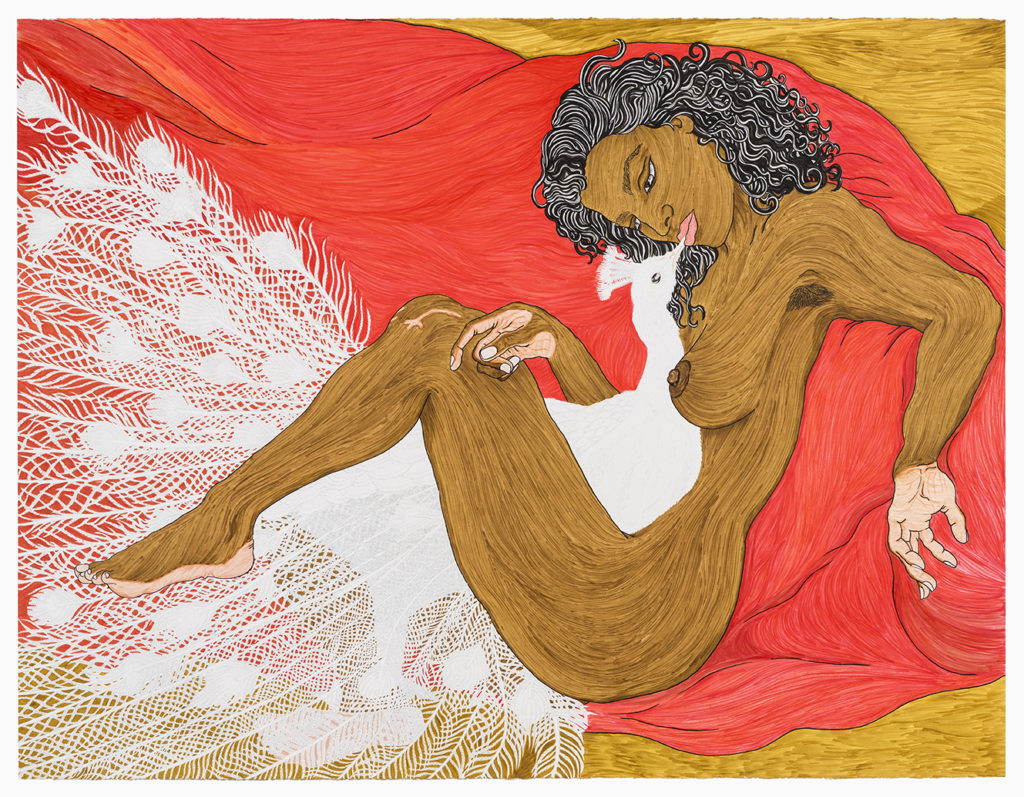1989
I am eight years old. I am standing in my bedroom looking up at the black woolly hair that crowns my mother’s head. We live in a bungalow in a largely white, working-class suburb of Western Sydney. My bedroom window looks out onto a stiff, spiky lawn, permanently kept yellow-green as the grass fails, year after year, to recover from the scorching Australian summers.
My mother is standing on one side of my bed and I am standing on the other, a sea of balding green bedspread between us. It is the summer after second grade and I have just written a letter to a school friend who moved to another suburb with her mother after her parents’ separation. It is the 1980s and the only contact we have outside of school with kids who don’t live on our street is to either ring their rotary dial telephone or to mail something. The word landline isn’t even in use because nobody has a mobile.
I ask my mother if we can post the letter I have written on pretty blue paper with violets printed around the edges.
“Can I read it?” she asks.
I say “No”.
Well, I don’t remember whether I said “No, it’s private,” or just “No,” but I do remember the sting of her anger.
“Girls who write private letters are the kinds of girls who have boyfriends!” she says, almost spitting the words out.
I am confused. It was not a need for privacy that made me withhold the letter from her. The letter was, after all, a very benign report of summer boredom from an 8-year-old who still had Humphrey B. Bear curtains hanging in their room. I just didn’t want my mother to mock my letter in that ‘kids-say-the-darndest-things’ way that I always expected from grown-ups.
My mother was not usually quick to anger and in comparison to my father who raged at the drop of a hat she always seemed super chill. Why was she now angry, disgusted even, with girls who have boyfriends?
What was wrong with having a boyfriend?
I was so stunned by her reaction I can’t actually trust my memory to recall what happened next. All I remember is a sense of deep confusion erupting from within. Maybe she opened the letter and spitefully read it front of me. Maybe she left it there on the green bedspread and it never got posted, or perhaps she posted it eventually, regretting how she’d reacted at the moment. I don’t remember what happened because what was happening for me, inside me, absorbed all my attention. A crack was opening up inside me and it was threatening to grow into a great chasm that could swallow me. It was the first time I realized that the rules applied to the girls at school, would be different to the rules applied to me.
1994
I am 12 years old. We live in a split-level house with five bedrooms, four bathrooms and a lawn that is now consistently soft and green. We are still in Western Sydney but we have moved to a nicer suburb, a suburb freshly carved out of bushland barely a decade ago. The council has erected signs around the neighborhood that say ‘This is a Better Towns Project’. When our neighbours have the tires stolen from the car parked on their driveway, everybody assumes the people who did it who came from the next suburb over.
It is my first year in High School. It has been twelve months since I had my first real crush on a boy and since then I have experienced a crushing desire for every remotely good-looking boy that crossed my path. I am addicted to the bittersweet feeling of unrequited love and sometimes spend hours sitting on the newly built spiral staircase of this new house daydreaming about boys. Every night I go to bed imagining the most passionate, epic love stories for myself with one of these boys whose projected image I consume like a drug.
I, of course, do not act on any of these feelings. I am only capable of longing. I would not dare to express even the name of a crush to my school friends who talked openly about their crushes all the time as if it were the most natural thing in the world. I am mired in insecurities that make me feel like an alien species, incapable of mating with humans. I cry into the mirror about the blackness of my skin and what I consider to be a bulbous nose and scrub myself with lemon and loofah every morning to make my skin lighter and brighter. My mother says she used to use lemon on her skin in Sri Lanka, to make her fairer. My mother has lighter skin than I do so, it seems to me, I might see results if I continue with it long enough. I march the aisles of chemists and supermarkets, obsessively studying all the beauty products and scour magazines for serums, putties, and sprays that will bring my frizzy hair under control. I know if I can just find the right curl mousse, and tone my skin down to an acceptable shade, I too can be loved.
In addition to this, I, have other, more formidable obstacles to acting on my feelings. I am simply not allowed to do what the white kids at school are allowed to do. I cannot even go to the movies with my friends without constructing a watertight argument for how this would further my education and contribute to my development as a human being. Sleepovers are pretty much out of the question unless I am willing to spend days in negotiations with my parents bringing in various character witnesses on behalf of white people they do not mix with socially. Most parties have been ruled out for me. My folks are like a two-person bureaucracy and my older brother is too wrapped up in his own problems to help me. Our parents are a united front. We are a fractious dissident group who can’t agree on a common cause.
My longing does not care about my circumstances. It is a feeling and like all feelings, it seeks expression. And so in a moment of ecstatic fantasy, I grab a marker and the nearest surface, which happened to be a travel-sized, tin checkerboard and I write on the back Gitanjali Loves XXXXX. XXXXX Loves Gitanjali. I place it under my pillow like a charm, like a spell, like there is juju being birthed into the world by the mere act of me writing our names together. I sleep with this piece of tin under my pillow for three nights. After the third night, my mother calls me downstairs. There is no one else around. My father is out and my brother has locked himself in his room to play computer games. She says, ‘come and sit down. I want to talk to you.’ A sliver of something begins to stir in my stomach but I sit down at the kitchen table anyway.
“I found something in your room…” she begins slowly.
He voice is low and smooth and ominously even. Her words slither up to me and I am suddenly afraid.
“What did you put under your pillow?” She asks, anger smouldering in her voice now. I am mortified that someone has discovered my crush. I just look at her as if I have just been hammered in the mouth. My mother’s anger is not subdued by my silence. As if I have spoken back, she begins to raise her voice just enough for it to become a menacing whisper.
She asks me a bunch of questions, which I field in a daze. The gist of what she is asking is how real is what I’ve written. My amygdala swings into action. All the time she is talking at me, the strong pulse of the reptilian brain wordlessly urges me to LIE! LIE! LIE! Because I can sense acutely now that this is not a normal conversation, we are not a normal family and a normal answer like “it’s just a boy I have a crush on” is going to be incomprehensible to her. I lie through my teeth, saying that I only wrote someone’s name down because the other girls were writing their crushes and I didn’t want to be left out. I am ashamed of myself for selling myself out in this way, disowning my own feelings.
“What haven’t we given you?” she demands to know. “We’ve just moved into this big house. This is for you guys, not for us! We’re about to go on a holiday…” She hisses. I look at her eyes, wild with outrage, and realise that my mother actually feels betrayed by me having my own feelings. I am mortified by her discovery of this fucking piece of tin, and also by her expectation that I would simply not have any desires in return for her providing me with what she considers to be a good life. I hadn’t realised that the new house would have to be paid for with my emotional autonomy. That the holiday we were taking was courtesy of my budding sexuality. Again I didn’t understand, why she was so angry.
She is an idiot, I thought to myself. And yet it was me who felt a prickling heat underneath my skin and a hole burning through my chest. And it was me who felt as if my bones had fallen away from underneath my flesh, as if the energy of her words had dissolved them into nothing. In that moment I hated my mother and I hated God for giving me this mother; a mother who couldn’t even let me like someone.
Even if I had the tools and the conviction to explain to her, how sexual feelings or teenage hormones work, I wouldn’t have been able to. I felt too ashamed to speak. That was what she should have been explaining to me, not the other way around. But how could she? My mother had married my father without even glancing at a photo of him. When I asked her about this she said, “I trusted my brothers so much that I didn’t need to see a picture of him.” She said it with pride, as if she was proud to have handed over all of her power to them to find her a husband. I never told anybody that my parents had an arranged marriage until well after I had graduated from University. I was ashamed of it and afraid that it would somehow reflect on my own sexuality, as if it would confirm that something was missing from me; that I was so new to this love game.
“Did you even think about whether their family would fit in with our family?” she demanded to know. Well, no, I thought to myself. Of course, I wasn’t thinking about whether his family would fit in with ours. I had bigger problems. I was still trying to make myself NOT UGLY. I felt I was surrounded, at school by carefree white nymphs with effortlessly flat stomachs, who had been shaving their legs since they were 10, some of whom had already had sex by the beginning of 8th grade, while I felt that nobody would even kiss me because I was like an alien in their midst. I was basically E.T: small, brown and of foreign origins, they could not fathom. I mean, everybody loved E.T, but nobody was going to fuck E.T.
Going between home and school back then was like going through the looking glass each day. Two sets of values, two sets of fears, two sets of threats, often diametrically opposed to each other, and nobody in either world who could comprehend the full picture of my life. Part of the shame attached to my sexuality came from being crushed between these two worlds. In one world my sexuality was straight up forbidden and any displays of desire or even emotional autonomy, punished with shame. In the other, it was considered laughably underdeveloped. The rampant, unchecked racism of the schoolyard instilled in me a sense of being undesirable, un-dateable and unclean because of the colour of my skin. In both worlds, I felt locked out of love and desire. As if that wasn’t enough, nowhere did I see brown bodies expressing love in a way I could understand or relate to. There was no movie at Blockbuster where a girl who looked like me fell in love. There were no songs on the radio about girls with bodies like mine. There were no sitcom families on TV having the kinds of conversations I had just had with my mother. It was like the sexuality I felt, alive and stirring within me, was invisible and unimaginable to the rest of the world.
In the days following this confrontation with my mother, I was plagued by a constant sinking sensation. I went to school and came back in a daze. I felt even more distant from my friends because I couldn’t tell them what happened. They wouldn’t have understood.
I concluded that nobody I already knew was going to help me in navigating this life. I was a new thing. I was the first generation in my family who could really choose whom they were going to be with and how. I realised that if I was going to access love and desire, not the love of my fantasies, but actual love- the kind I was always afraid might not exist, I was going to have to disobey the fuck out of everyone, beginning with my mother. And because my life was so restricted back then, that disobedience was going to have to start from within. I was going to feed my inner life everything that it would need to break through the bonds of shame and ignorance.
I went to the one place I never had to ask permission to go: The Public Library. There, between pages of fiction, poetry and essays written by people I would never be allowed to hang out with, I found others who were also crushed between worlds, people whose sexuality was forbidden, people who found themselves grossly devalued by whiteness, people whose mothers did not understand them. There in those pages were other people who also had to disobey the fuck out of everyone in order to just live.
From within this internal world, I began to join the dots that helped me make sense of why people were always attempting to control my body. I learnt about the caste system and understood the role that would have played in my mother’s fear of my sexuality. I read about misogyny and how women are shamed and battered into compliance the world over. I read about whiteness and how it desexualizes or hypersexualizes you depending on how you are racialized through the white gaze. I analysed the institution of marriage without the hindrance of Hallmark sentiments.
Over time I was soothed and strengthened by the voices of people who had found words for what had hurt them in life. I found solace in Maya Angelou, Toni Morrison, Arundhati Roy, Oscar Wilde, Jean Genet, Helen Garner, Sally Morgan, Kim Scott. What happened to me was that I learnt from them how to express my own shame, first of all to myself, and then to others who could witness it in the spirit of compassion. In this way, feeding my internal life allowed me to find friendships, lovers, adventures that nobody was ever going to give me permission for.
People like to say that to raise a child, all you need is love. But I needed a lot more than love. I needed critical thinking and story and the testimony of iconoclasts who have come before. My mother loved me and that just was not enough to free me from the shame I was meant to inherit. When you come from generations of women who had to marry for social security and survival, shame is your inheritance. When you come from a community where you have to come out of the closet as having any desire at all, shame is your inheritance. My mother thought she was acting out of love by protecting me from things she thought would damage my chances of marrying well, studying hard, achieving goals. She used the tool she was most familiar with, shame. I wanted that cycle to end with me.
When I look back now I realise that perhaps my mother was right about one thing. Girls who write letters probably are the kinds of girls who have boyfriends, in that, girls who can put pen to paper and express something from within are the kinds of girls who will have access to their own desire. They are the kinds of girls who will not wait for permission to experience the fullness of their humanity.
************************************************************************************
Gitanjali is an Australian writer of Sri Lankan Tamil heritage. She is a VONA Alumni (2015 and 2016) and was a recipient of the Australia Council Grant, ArtStart (2015). She currently resides in Sydney, Australia where she is working on her first novel.
 Wendy Angulo Productions
Wendy Angulo Productions






